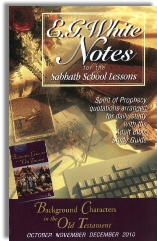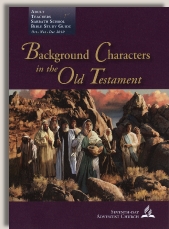|
||||||||||||||
Commentary on "Story and History"
Day 7: Friday, October 1, 2010 - Further Study
Overview
Friday’s lesson, as always, is a short collection of Ellen White quotations followed by discussion questions. The Ellen White quotes instruct the readers to be students of “the divine philosophy of sacred Scripture” and not to forget the ways God has led His people in the past. The second quotation from Selected Messages, bk. 3, refers specifically to EGW’s amazement at how the Adventist movement had grown.
The lesson ends with questions asking the reader to ponder God’s involvement in history, the effectiveness of “stories”, the way “internal fighting” weakened ancient Israel and distracted them from being witnesses, and the ways one often passes judgment on others without knowing all the facts.
Observations
This week’s summary wraps up the week’s introduction of “story”, and again, the central point of the Bible’s stories is missed. Never does the Bible instruct us to be students of “divine philosophy”. Rather, the Bible records God’s interactions with sinful humanity as a means of teaching us to trust Him. The point of the stories in the Bible is that God has made promises to His people, and He keeps them, whether or not it looks as if people are true to Him.
The point of Israel’s divided monarchy and subsequent dissolution and exile, for example, is not simply that they were weakened by internal strife. Rather, they were disciplined by God for their apostasy—and even in that, God was keeping and is still keeping His promises. Their exile did not destroy Israel; He brought them back to Judah and re-established the nation and the temple.
Even though Israel lost the glory of their early monarchy days, God was still keeping His promise to send a Redeemer through the tribe of Judah and the family of David. And God is still keeping His promise to restore all Israel and bring them into submission to the Lord Jesus when He will physically sit on His eternal throne (Romans 11; Revelation 20).
The Bible is not primarily the story of people; it is the revelation of God’s sovereignty and faithfulness, His unconditional promises and His certain fulfillment of those promises whether or not people cooperate.
The quarterly misses the point that God’s specific covenant with Israel, the Mosaic covenant, was conditional upon their obedience, but His overarching promises to Abraham, the patriarchs, and David are unconditional. They do not depend upon any human contribution. Similarly, the new covenant ushered in after Jesus’ death and resurrection and consummated at Pentecost is unconditional. Everyone who places faith in the Lord Jesus will be saved and sealed with the Holy Spirit (Eph. 1:13-14; Romans 8). This promise does not depend in any way upon our consistency or good behavior. We do not receive justification by faith and then stand to lose it by disobedience.
John 5:24 states that all those who believe in His name pass from death to life; this passage is not reversible. We are born of the Spirit just as permanently as we are born of the flesh.
Ask God to reveal to you what He wants you to know from Scripture. Ask Him to help you read it without your presuppositions and definitions. Ask Him to show you what is real and true and to ground you in Himself. Ask Him to forgive your sin and to be your Lord, teaching you to trust Him with your life and with your mind.
Summary
- The Bible does not teach us to study “divine philosophy”.
- The Bible stories are not stories of men but rather are stories of God’s faithfulness to keep His promises and to bring people into His story.
- Bible stories are not moral object lessons. God does not enter our “stories” and bring a divine element into our temporal lives.
- Rather, all of history is God’s story, and the Bible shows how He draws sinful men and women into His eternal story and gives them roles to play in His history.
- God’s plans are certain; His promises are unconditional, and what He has said He will do—He WILL do, whether or not things look physically as if all hope is gone.
- God’s “success” does not depend in any degree upon the cooperation of man. God’s plans happen on time with or without human “help”.
- Ask God to reveal Himself to you as He really is. Ask Him to forgive your sin and to be your Lord.
Copyright 2010 BibleStudiesForAdventists.com. All rights reserved. Revised September 29, 2010. This website is published by Life Assurance Ministries, Glendale, Arizona, USA, the publisher of Proclamation! Magazine. Contact email: BibleStudiesForAdventists@gmail.com.
The Sabbath School Bible Study Guide and the corresponding E.G. White Notes are published by Pacific Press Publishing Association, which is owned and operated by the Seventh-day Adventist church. The current quarter's editions are pictured above.
Official Adventist Resources
Standard Edition Study Guide Week 1
Teacher's Edition Study Guide Week 1
Easy Reading Edition Study Guide Wk 1
Search the Complete Published Ellen G. White Writings


